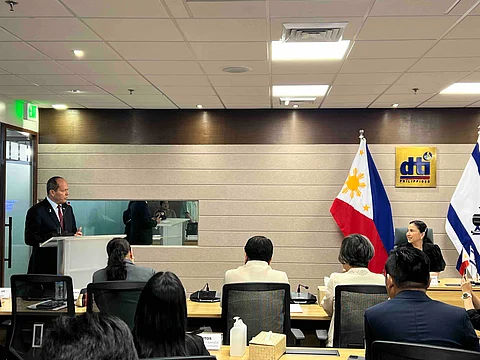
- NEWS
- the EDIT
- COMMENTARY
- BUSINESS
- LIFE
- SHOW
- ACTION
- GLOBAL GOALS
- SNAPS
- DYARYO TIRADA
- MORE

Amid the ongoing uncertainty in the United States’ tariff talks, the Philippines may soon enjoy more trade options with the Middle Eastern country Israel, as the two countries’ trade leaders signaled their willingness to begin free trade agreement (FTA) negotiations.
Trade Secretary Cristina Roque said consultations are underway with Israeli counterparts for an FTA, similar to those being pursued with other nations, in line with the directive of President Ferdinand Marcos Jr.
“But before we can get started, we have to start consultations with different stakeholders and also with the different industries. But we hope to push for this FTA with Israel, and we want to accomplish it before the term of PBBM ends,” she said in a press conference following her bilateral meeting with Israeli Minister of Economy and Industry Nir Barkat at the DTI office in Makati City on Tuesday.
For his part, Israeli Minister Barkat said that Israel strongly supports FTAs, having already signed over 16 with various countries, including Vietnam, the Philippines’ tough competitor in the ASEAN region when it comes to investments.
“We are in the process of doing an FTA with India and Japan, and we want to continue this with the Philippines. We believe in the relationship between the two countries,” he said.
On 1 July, Secretary Roque and Minister Barkat held a virtual meeting that culminated in the signing of a Summary of Discussions outlining key areas of future economic cooperation. These include agriculture, innovation, start-ups, cybersecurity, and trade and investment promotion and facilitation.
Barkat said that with an FTA, Philippine exports to Israel are expected to increase.
“We will not export fruit and vegetables to the Philippines, but the technology that would increase yields, productivity, and the ability to create more food,” he said, allaying fears that Philippine agriculture would be negatively affected by a trade agreement.
“So, what we propose is how we can do things much better, much faster, and as much as the Philippines would like to adopt new technology that increases the GDP and the productivity. That’s where we come into the picture. So, we’re probably going to be much bigger importers, but also exporters. We’re not doing the same. So, it’s a classic win-win, in my mind, that the FTA could provide,” Barkat further explained.
On agriculture, both parties discussed strengthening private sector participation in collaborative development projects.
Key areas explored included innovative irrigation systems, climate-adapted crop varieties, and the establishment of livestock complexes and smart greenhouses.
Discussions also focused on knowledge-sharing in agrotechnology, and adopting modern, resource-efficient water and land management systems.
Technological innovation and research and development (R&D) also featured prominently, as both sides aim to implement the 2022 Agreement on Cooperation in Technological Innovation, Research and Development, signed on 6 June 2022.
This includes pursuing R&D and pilot projects through joint calls for proposals, and supporting these through the exchange of experiences, best practices, and startup development strategies.
With the growing importance of digital connectivity, cybersecurity emerged as a key area of collaboration.
Both parties expressed readiness to cooperate through discussions, information sharing, and capacity-building in various areas.
Other topics of mutual interest included intellectual property rights, training and development, customs, and trade promotion.
The successful bilateral meeting and the signing of the Summary of Discussions mark a significant step forward in the Philippines–Israel economic partnership, laying the groundwork for practical actions and continued dialogue in pursuit of shared economic goals.
